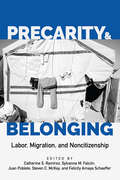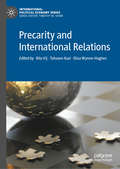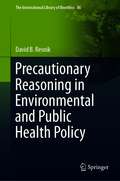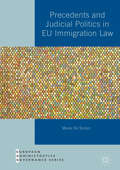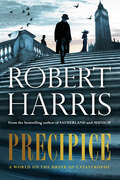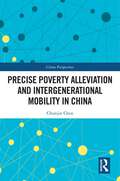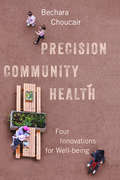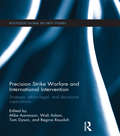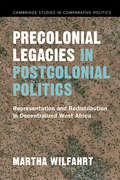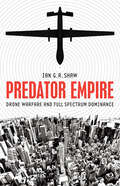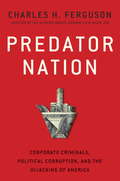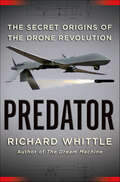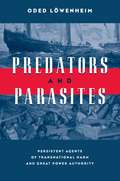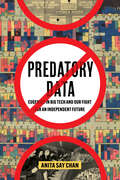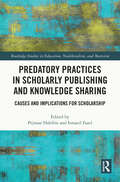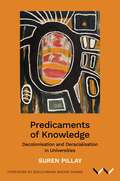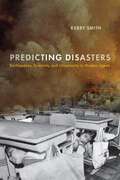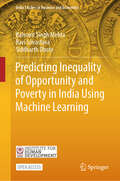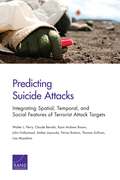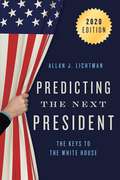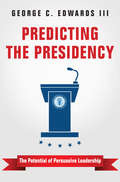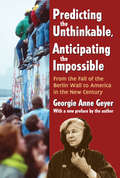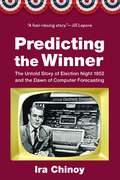- Table View
- List View
Precarity and Belonging: Labor, Migration, and Noncitizenship (Latinidad: Transnational Cultures in the United States)
by Catherine S. RamírezPrecarity and Belonging examines how the movement of people and their incorporation, marginalization, and exclusion, under epochal conditions of labor and social precarity affecting both citizens and noncitizens, have challenged older notions of citizenship and alienage. This collection brings mobility, precarity, and citizenship together in order to explore the points of contact and friction, and, thus, the spaces for a possible politics of commonality between citizens and noncitizens.The editors ask: What does modern citizenship mean in a world of citizens, denizens, and noncitizens, such as undocumented migrants, guest workers, permanent residents, refugees, detainees, and stateless people? How is the concept of citizenship, based on assumptions of deservingness, legality, and productivity, challenged when people of various and competing statuses and differential citizenship practices interact with each other, revealing their co-constitutive connections? How is citizenship valued or revalued when labor and social precarity impact those who seemingly have formal rights and those who seemingly or effectively do not? This book interrogates such binaries as citizen/noncitizen, insider/outsider, entitled/unentitled, “legal”/“illegal,” and deserving/undeserving in order to explore the fluidity--that is, the dynamism and malleability--of the spectra of belonging.
Precarity and International Relations (International Political Economy Series)
by Ritu Vij Tahseen Kazi Elisa Wynne-HughesThis book addresses the implications of current thinking on precarity, precariousness and the precariat for the study of International Relations and International Political Economy. Drawing on a broad range of critical theoretical resources including literatures on aesthetics and psychoanalysis as well as feminist, Foucauldian, Marxian and postcolonial social theory, it explores the implications of precarity thought for three concepts: Sovereignty, Solidarities and Work in International Relations. Does precarity re-inscribe or undermine the logic and practices of sovereignty? As a common condition and point of mobilization, does precarity represent a new labor activism or does it find ethical grounds for solidarities that destabilize identities? How is precarity located, practiced and occluded in work relations? Running counter to the contemporary impulse to grasp precarity and processes of its proliferation in homogenized terms as either being ensconced in national imaginaries, or as ushering in a condition of global precarity and a global precariat class, the book also underscores the entanglements of the global, national and local in the discursive and material production of precarity and precariousness in the present conjuncture.
Precautionary Reasoning in Environmental and Public Health Policy (The International Library of Bioethics #86)
by David B. ResnikThis book fills a gap in the literature on the Precautionary Principle by placing the principle within the wider context of precautionary reasoning and uses philosophical arguments and case studies to demonstrate when it does—and does not—apply. The book invites the reader to take a step back from the controversy surrounding the Precautionary Principle and consider the overarching rationales for responding to threats to the environment or public health. It provides practical guidance and probing insight for the intended audience, including scholars, students, journalists, and policymakers.
Precedents and Judicial Politics in EU Immigration Law (European Administrative Governance)
by Marie De SomerThis study explores the use of precedents in the case law of the Court of Justice of the European Union (CJEU). It argues that a strategic use of precedent-based discourses aids the Court in developing its jurisprudence autonomously; that is, independent of the political preferences of EU member states. The study is based on a long-term assessment of CJEU case law in the politically sensitive area of immigration law. It traces the Court’s rulings in this area from the 1970s up until the most recent period. The study identifies a series of consistent discursive patterns that slowly, but surely, moved EU immigration law beyond what member states had intended. The work takes an interdisciplinary approach, engaging with both political science and legal discussions on the Court of Justice and its role in processes of European integration.
Precipice
by Robert HarrisA WORLD ON THE BRINK OF WAR. AN AFFAIR ON THE EDGE OF SCANDAL.A spellbinding novel of passion, intrigue and betrayal set in England in the weeks leading to the Great War. From the bestselling author of Conclave, Act of Oblivion, Fatherland and Munich.Summer 1914.In London, 26-year-old Venetia Stanley – aristocratic, intelligent, bored, reckless – is having a love affair with the Prime Minister, H. H. Asquith, a man more than twice her age. He writes to her obsessively, sharing the most sensitive matters of state. As Asquith reluctantly leads the country into war with Germany, a young intelligence officer is assigned to investigate a leak of top-secret documents. Suddenly what was a sexual intrigue becomes a matter of national security that could topple the British government – and will alter the course of political history.Seamlessly weaving fact and fiction in a way that no writer does better, Precipice is the thrilling new novel from Robert Harris.
Precise Poverty Alleviation and Intergenerational Mobility in China (China Perspectives)
by Chunjin ChenThe widening of income and wealth inequality has become one of the most important obstacles on the road to China’s common prosperity. In the context of inequality reduction and anti-poverty strategy in China, this book investigates the complex relationship between education and intergenerational mobility in terms of occupation and income. Based on large-scale social survey data, cutting-edge econometric models and statistical methods, the book examines the role of education in breaking the intergenerational transmission of poverty and promoting intergenerational mobility. It analyzes the characteristics of birth cohorts in intergenerational mobility, the long-term trends of educational, occupational, and income mobility among rural and urban residents across generations, and also the different regional patterns of intergenerational mobility against the background of social changes in China. Based on empirical findings, the author advances suggestions on an education policy conducive to poverty alleviation. The book will appeal to scholars and students studying the sociology of education, the economics of education and Chinese education, as well as policy makers interested in the topics of education policy systems and poverty alleviation, as well as education equity and social mobility.
Precision Community Health: Four Innovations for Well-being
by Bechara ChoucairWhen Bechara Choucair was a young doctor, he learned an important lesson: treating a patient for hypothermia does little good if she has to spend the next night out in the freezing cold. As health commissioner of Chicago, he was determined to address the societal causes of disease and focus the city's resources on its most vulnerable populations. That targeted approach has led to dramatic successes, such as lowering rates of smoking, teen pregnancy, breast cancer mortalities, and other serious ills.In Precision Community Health, Choucair shows how those successes can be replicated and expanded around the country. The key is to use advanced technologies to identify which populations are most at risk for specific health threats and avert crises before they begin. Big data makes precision community health possible. But in our increasingly complex world, we also need new strategies for developing effective coalitions, media campaigns, and policies. This book showcases four innovations that move public health departments away from simply dispensing medical care and toward supporting communities to achieve true well-being.The approach Choucair pioneered in Chicago requires broadening our thinking about what constitutes public health. It is not simply about access to a doctor, but access to decent housing, jobs, parks, food, and social support. It also means acknowledging that a one-size-fits-all strategy may exacerbate inequities. By focusing on those most in need, we create an agenda that is simultaneously more impactful and more achievable. The result is a wholesale change in the way public health is practiced and in the well-being of all our communities.
Precision Strike Warfare and International Intervention: Strategic, Ethico-Legal and Decisional Implications (Routledge Global Security Studies)
by Tom Dyson Regina Rauxloh Mike Aaronson Wali AslamThis book explores whether the new capabilities made possible by precision-strike technologies are reshaping approaches to international intervention. Since the end of the Cold War, US technological superiority has led to a more proactive and, some would argue, high risk approach to international military intervention. New technologies including the capacity to mount precision military strikes from high-level bombing campaigns and, more recently, the selective targeting of individuals from unmanned aerial vehicles (UAVs) have facilitated air campaigns, supported by Special Forces, without the commitment of large numbers of troops on the ground. Such campaigns include, for example, NATO’s high-level aerial bombardment of Milosevic’s forces in Kosovo in 1999 and of Gaddafi’s in Libya in 2011, and the US operation involving Special Forces against Osama Bin Laden. The development of UAVs and electronic data intercept technologies has further expanded the potential scope of interventions, for example against Islamic militants in the tribal areas of Pakistan. This volume examines three key and interrelated dimensions of these new precision-strike capabilities: (1) the strategic and foreign policy drivers and consequences; (2) the legal and moral implications of the new capabilities; and (3), the implications for decision-making at the strategic, operational and tactical levels. This book will be of much interest to students of war and technology, air power, international intervention, security studies and IR.
Precolonial Legacies in Postcolonial Politics: Representation and Redistribution in Decentralized West Africa (Cambridge Studies in Comparative Politics)
by Martha WilfahrtWhy are some communities able to come together to improve their collective lot while others are not? Looking at variation in local government performance in decentralized West Africa, this book advances a novel answer to this question: communities are better able to coordinate around basic service delivery when their formal jurisdictional boundaries overlap with informal social institutions, or norms. This book identifies the precolonial past as the driver of striking subnational variation in the present because these social institutions only encompass the many villages of the local state in areas that were once home to precolonial polities. Drawing on a multi-method research design, the book develops and tests a theory of institutional congruence to document how the past shapes contemporary elite approaches to redistribution within the local state. Where precolonial kingdoms left behind collective identities and dense social networks, local elites find it easier to cooperate following decentralization.
Precolonial Legacies in Postcolonial Politics: Representation and Redistribution in Decentralized West Africa (Cambridge Studies in Comparative Politics)
by Martha WilfahrtWhy are some communities able to come together to improve their collective lot while others are not? Looking at variation in local government performance in decentralized West Africa, this book advances a novel answer: communities are better able to coordinate around basic service delivery when their formal jurisdictional boundaries overlap with informal social institutions, or norms. This book identifies the precolonial past as the driver of striking subnational variation in the present because these social institutions only encompass the many villages of the local state in areas that were once home to precolonial polities. The book develops and tests a theory of institutional congruence to document how the past shapes contemporary elite approaches to redistribution within the local state. Where precolonial kingdoms left behind collective identities and dense social networks, local elites find it easier to cooperate following decentralization. This title is also available as Open Access on Cambridge Core.
Predator Empire: Drone Warfare and Full Spectrum Dominance
by Ian G. ShawWhat does it mean for human beings to exist in an era of dronified state violence? How can we understand the rise of robotic systems of power and domination? Focusing on U.S. drone warfare and its broader implications as no other book has to date, Predator Empire argues that we are witnessing a transition from a labor-intensive &“American empire&” to a machine-intensive &“Predator Empire.&” Moving from the Vietnam War to the War on Terror and beyond, Ian G. R. Shaw reveals how changes in military strategy, domestic policing, and state surveillance have come together to enclose our planet in a robotic system of control. The rise of drones presents a series of &“existential crises,&” he suggests, that are reengineering not only spaces of violence but also the character of the modern state. Positioning drone warfare as part of a much longer project to watch and enclose the human species, he shows that for decades—centuries even—human existence has slowly but surely been brought within the artificial worlds of &“technological civilization.&” Instead of incarcerating us in prisons or colonizing territory directly, the Predator Empire locks us inside a worldwide system of electromagnetic enclosure—in which democratic ideals give way to a system of totalitarian control, a machinic &“rule by Nobody.&” As accessibly written as it is theoretically ambitious, Predator Empire provides up-to-date information about U.S. drone warfare, as well as an in-depth history of the rise of drones.
Predator Nation: Corporate Criminals, Political Corruption, and the Hijacking of America
by Charles H. FergusonCharles H. Ferguson, who electrified the world with his Oscar-winning documentary Inside Job, now explains how a predator elite took over the country, step by step, and he exposes the networks of academic, financial, and political influence, in all recent administrations, that prepared the predators' path to conquest. Over the last several decades, the United States has undergone one of the most radical social and economic transformations in its history. · Finance has become America's dominant industry, while manufacturing, even for high technology industries, has nearly disappeared. · The financial sector has become increasingly criminalized, with the widespread fraud that caused the housing bubble going completely unpunished. · Federal tax collections as a share of GDP are at their lowest level in sixty years, with the wealthy and highly profitable corporations enjoying the greatest tax reductions. · Most shockingly, the United States, so long the beacon of opportunity for the ambitious poor, has become one of the world's most unequal and unfair societies. If you're smart and a hard worker, but your parents aren't rich, you're now better off being born in Munich, Germany or in Singapore than in Cleveland, Ohio or New York. This radical shift did not happen by accident. Ferguson shows how, since the Reagan administration in the 1980s, both major political parties have become captives of the moneyed elite. It was the Clinton administration that dismantled the regulatory controls that protected the average citizen from avaricious financiers. It was the Bush team that destroyed the federal revenue base with its grotesquely skewed tax cuts for the rich. And it is the Obama White House that has allowed financial criminals to continue to operate unchecked, even after supposed "reforms" installed after the collapse of 2008. Predator Nation reveals how once-revered figures like Alan Greenspan and Larry Summers became mere courtiers to the elite. Based on many newly released court filings, it details the extent of the crimes--there is no other word--committed in the frenzied chase for wealth that caused the financial crisis. And, finally, it lays out a plan of action for how we might take back our country and the American dream.
Predator: The Secret Origins of the Drone Revolution
by Richard WhittleThe untold story of the birth of the Predator drone, a wonder weapon that transformed the American military, reshaped modern warfare, and sparked a revolution in aviationThe creation of the first weapon in history whose operators can stalk and kill an enemy on the other side of the globe was far more than clever engineering. As Richard Whittle shows in Predator, it was one of the most profound developments in the history of military and aerospace technology.Once considered fragile toys, drones were long thought to be of limited utility. The Predator itself was resisted at nearly every turn by the military establishment, but a few iconoclasts refused to see this new technology smothered at birth. The remarkable cast of characters responsible for developing the Predator includes a former Israeli inventor who turned his Los Angeles garage into a drone laboratory, two billionaire brothers marketing a futuristic weapon to help combat Communism, a pair of fighter pilots willing to buck their white-scarf fraternity, a cunning Pentagon operator nicknamed "Snake," and a secretive Air Force organization known as Big Safari. When an Air Force team unleashed the first lethal drone strikes in 2001 for the CIA, the military's view of drones changed nearly overnight.Based on five years of research and hundreds of interviews, Predator reveals the dramatic inside story of the creation of a revolutionary weapon that forever changed the way we wage war and opened the door to a new age in aviation.
Predators and Parasites: Persistent Agents of Transnational Harm and Great Power Authority
by Oded LowenheimLöwenheim (Hebrew U. of Jerusalem) defines persistent agents of transnational harm (PATHs) as private groups, organizations, or networks that operate across state borders and deliberately cause for facilitate harm in the pursuit of their interests; polluters and tobacco dealers are among them. He explores why Great Powers counter their practices, but his examples are limited to the Barbary Pirates and anyone the US administration has called out after the 9/11 attacks. Annotation ©2007 Book News, Inc. , Portland, OR (booknews. com)
Predatory Data: Eugenics in Big Tech and Our Fight for an Independent Future
by Anita Say ChanThe first book to draw a direct line between the datafication and prediction techniques of past eugenicists and today's often violent and extractive "big data" regimes. Predatory Data illuminates the throughline between the nineteenth century's anti-immigration and eugenics movements and our sprawling systems of techno-surveillance and algorithmic discrimination. With this book, Anita Say Chan offers a historical, globally multisited analysis of the relations of dispossession, misrecognition, and segregation expanded by dominant knowledge institutions in the Age of Big Data. While technological advancement has a tendency to feel inevitable, it always has a history, including efforts to chart a path for alternative futures and the important parallel story of defiant refusal and liberatory activism. Chan explores how more than a century ago, feminist, immigrant, and other minoritized actors refused dominant institutional research norms and worked to develop alternative data practices whose methods and traditions continue to reverberate through global justice-based data initiatives today. Looking to the past to shape our future, this book charts a path for an alternative historical consciousness grounded in the pursuit of global justice. A free ebook version of this title is available through Luminos, University of California Press’s Open Access publishing program. Visit www.luminosoa.org to learn more.
Predatory Practices in Scholarly Publishing and Knowledge Sharing: Causes and Implications for Scholarship (Routledge Studies in Education, Neoliberalism, and Marxism)
by Pejman Habibie Ismaeil FazelThis volume offers comprehensive examination of “predatory” practices in scholarly publishing, and highlights emergent issues around predatory journals, Open Access (OA), and scam conferences. Chapters engage multiple methodologies, including corpus, discourse, and genre analysis, as well as historical and autoethnographic approaches to offer in-depth, empirical analyses of the causes, practices, and implications of predatory practices for scholars. Contributors span a broad range of disciplines and geolocations, presenting a diverse range of perspectives. The volume also outlines effective initiatives for the identification of predatory practices and considers steps to increase understanding of viable publishing options. Providing a needed exploration of predatory research practices, this book will appeal to scholars and researchers with interests in higher education, publishing, and communication ethics.
Predatory Practices in Scholarly Publishing and Knowledge Sharing: Causes and Implications for Scholarship (Routledge Studies in Education, Neoliberalism, and Marxism)
by Pejman Habibie Ismaeil FazelThis volume offers comprehensive examination of “predatory” practices in scholarly publishing, and highlights emergent issues around predatory journals, Open Access (OA), and scam conferences.Chapters engage multiple methodologies, including corpus, discourse, and genre analysis, as well as historical and autoethnographic approaches to offer in-depth, empirical analyses of the causes, practices, and implications of predatory practices for scholars. Contributors span a broad range of disciplines and geolocations, presenting a diverse range of perspectives. The volume also outlines effective initiatives for the identification of predatory practices and considers steps to increase understanding of viable publishing options.Providing a needed exploration of predatory research practices, this book will appeal to scholars and researchers with interests in higher education, publishing, and communication ethics.
Predicaments of Knowledge: Decolonisation and Deracialisation in Universities
by Suren PillayPredicaments of Knowledge explores the difficult questions South African universities face after apartheid: Is there a difference between Africanising a university and decolonising a university? What about differences between deracialising and decolonising the curricula taught at universities across disciplines? Through a range of reflections on race, language, colonial, postcolonial and decolonial knowledge projects from Africa and Latin America, this book explores the pitfalls and possibilities that face a post-apartheid generation inventing the future of knowledge. The distinctions between Africanisation, decolonisation and deracialisation are often conflated in the political demands put to universities. Suren Pillay emphasises all three as important but distinct imperatives. If an intervention is undertaken with the aim of decolonising the university while actually addressing deracialisation, it can undermine the effort to decolonise. Similarly, if an initiative to Africanise the university does not address decolonisation, both processes can be undermined. Drawing on more than two and a half decades of the author’s participation in these debates, these essays aim to intervene in and elucidate questions and predicaments, rather than offering blue prints; they are dialogical in spirit even when polemical in tone. In conversation with existing continental African and Latin American experiences, they offer incisive reflections on current South African debates.
Predicting Disasters: Earthquakes, Scientists, and Uncertainty in Modern Japan (Critical Studies in Risk and Disaster)
by Kerry SmithJapan is a place where powerful earthquakes have occurred more frequently and have caused more harm in the modern era than they have in all but a handful of other locations on the planet. In the twentieth century alone, earthquake disasters in Japan took almost as many lives as they had in all of the country’s recorded history up to that point. Predicting Disasters is the first English-language book to explore how scientists convinced policy makers and the public in postwar Japan that catastrophic earthquakes were coming, and the first to show why earthquake prediction has played such a central role in Japan’s efforts to prepare for a dangerous future ever since.Kerry Smith shows how, in the twentieth century, scientists struggled to make large-scale earthquake disasters legible to the public and to policy makers as significant threats to Japan’s future and as phenomena that could be anticipated and prepared for. Smith also explains why understanding those struggles matters. Disasters, Smith contends, belong alongside more familiar topics of analysis in modern Japanese history—such as economic growth and its impacts, political crises and popular protest, and even the legacies of the war—for the work they do in helping us better understand how the past has influenced beliefs about Japan’s possible futures, and how beliefs about the future shape the present.Predicting Disasters makes relevant elements of Japan’s past more accessible to readers interested in the histories of disaster and scientific communities, as well as to those who want to gain a better understanding of the risk and uncertainty surrounding natural phenomena.
Predicting Inequality of Opportunity and Poverty in India Using Machine Learning (India Studies in Business and Economics)
by Balwant Singh Mehta Ravi Srivastava Siddharth DhoteThis open-access book combines traditional economic methods with newer machine learning techniques such as regression trees and random forests to analyse data and provide an in-depth analysis of inequality of opportunity and poverty in India. Using data from national surveys and unique sources like night-time satellite images and location data of points of interest, it explores different aspects of inequality and poverty. The book adopts a unique interdisciplinary approach, blending theories and methods from sociology, economics, geography, anthropology, and computer science to explore three key aspects of human well-being: income, health, and education, focusing on regional disparities. It aims to offer practical insights for policymakers and researchers who want to address social and economic inequalities in India.
Predicting Suicide Attacks: Integrating Spatial, Temporal, and Social Features of Terrorist Attack Targets
by Walter L. Perry Claude Berrebi Thomas Sullivan John Hollywood Parisa Roshan Ryan Andrew Brown Amber Jaycocks Lisa MiyashiroAs part of an exploration of ways to predict what determines the targets of suicide attacks, RAND conducted a proof-of-principle analysis of whether adding sociocultural, political, economic, and demographic factors would enhance the predictive ability of a methodology that focused on geospatial features. This test case focused on terrorist bombing incidents in Israel, but the findings indicate that the methodology merits further exploration.
Predicting the Next President: The Keys To The White House
by Allan J. LichtmanIn the days after Donald Trump’s unexpected victory on election night 2016, The New York Times, CNN, and other leading media outlets reached out to one of the few pundits who had correctly predicted the outcome, Allan J. Lichtman. While many election forecasters base their findings exclusively on public opinion polls, Lichtman looks at the underlying fundamentals that have driven every presidential election since 1860. Using his 13 historical factors or “keys” (four political, seven performance, and two personality), that determine the outcome of presidential elections, Lichtman had been predicting Trump’s win since September 2016. In the updated 2020 edition of this classic text, Lichtman applies the keys to every presidential election since 1860 and shows readers the current state of the 2020 race. In doing so, he dispels much of the mystery behind electoral politics and challenges many traditional assumptions. An indispensable resource for political junkies!
Predicting the Presidency: The Potential of Persuasive Leadership
by George C. Edwards IIIMillions of Americans—including many experienced politicians—viewed Barack Obama through a prism of high expectations, based on a belief in the power of presidential persuasion. Yet many who were inspired by candidate Obama were disappointed in what he was able to accomplish once in the White House. They could not understand why he often was unable to leverage his position and political skills to move the public and Congress to support his initiatives. Predicting the Presidency explains why Obama had such difficulty bringing about the change he promised, and challenges the conventional wisdom about presidential leadership. In this incisive book, George Edwards shows how we can ask a few fundamental questions about the context of a presidency—the president's strategic position or opportunity structure—and use the answers to predict a president's success in winning support for his initiatives. If presidential success is largely determined by a president's strategic position, what role does persuasion play? Almost every president finds that a significant segment of the public and his fellow partisans in Congress are predisposed to follow his lead. Others may support the White House out of self-interest. Edwards explores the possibilities of the president exploiting such support, providing a more realistic view of the potential of presidential persuasion. Written by a leading presidential scholar, Predicting the Presidency sheds new light on the limitations and opportunities of presidential leadership.
Predicting the Unthinkable, Anticipating the Impossible: From the Fall of the Berlin Wall to America in the New Century
by Georgie Anne GeyerIn the 1980s, most Americans scoffed at the idea that the Communist empire could collapse - but Georgie Anne Geyer was already outlining that probability. In the 1990s, the world was stunned by wars that raged across post-Yugoslavia and their viciousness - but Geyer on a trip to Belgrade in 1989, interviewed top officials and anticipated the conflicts. When 9/11 occurred, she used common sense and said, 'This was inevitable - the terrorists had already attacked the World Trade Center in 1993 and criminals always return to the scene of the crime.'Geyer argues that while the United States was being praised everywhere during this era of 'indispensable power' as the 'greatest power the world has known,' it actually had started on the road to decline. It had won the Cold War, but had immediately embarked upon more Vietnam-like small wars of tremendous cost in Iraq and Afghanistan. Across the board, it was no longer paying its way, while its domestic culture was being vulgarized at every turn.This book explains how, when, and where these declines happened. Geyer studies the history of nations and of peoples, observes human nature, particularly as influenced by religion and ideology; and is a close analyst of the acts of men and women when they perceive they have been humiliated by others or by history. She warns Americans and journalists that we must anticipate the changes in the world before they are upon us and that we must employ predictions to strengthen our nation and its principles.
Predicting the Winner: The Untold Story of Election Night 1952 and the Dawn of Computer Forecasting
by Ira ChinoyThe history of American elections changed profoundly on the night of November 4, 1952. An outside-the-box approach to predicting winners from early returns with new tools—computers—was launched live and untested on the newest medium for news: television. Like exhibits in a freak show, computers were referred to as &“electronic brains&” and &“mechanical monsters.&” Yet this innovation would help fuel an obsession with numbers as a way of understanding and shaping politics. It would engender controversy down to our own time. And it would herald a future in which the public square would go digital. The gamble was fueled by a crisis of credibility stemming from faulty election-night forecasts four years earlier, in 1948, combined with a lackluster presentation of returns. What transpired in 1952 is a complex tale of responses to innovation, which Ira Chinoy makes understandable via a surprising history of election nights as venues for rolling out new technologies, refining methods of prediction, and providing opportunities for news organizations to shine. In Predicting the Winner Chinoy tells in detail for the first time the story of the 1952 election night—a night with continuing implications for the way forward from the dramatic events of 2020–21 and for future election nights in the United States.
